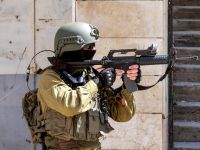US Vice President Dick Cheney on Sunday reiterated that Washington was "deadly serious" about preventing Baghdad from acquiring nuclear weapons and downplayed the importance of sending UN weapons inspectors back to Iraq.
"The issue's not inspectors. The issue is that he (Saddam Hussein) has chemical weapons and he's used them," Cheney said in an interview with CNN.
"The issue is that he's developing and has biological weapons. The issue is that he's pursuing nuclear weapons".
While pressing for a return of UN weapons inspectors to Iraq, Washington fears Baghdad will use the issue to stonewall and dupe the international community, AFP reported.
US officials instead appear to be laying the early foundation for military action against Saddam's regime, after labeling Iraq as part of an "axis of evil" along with North Korea and Iran.
"I think it would be a great tragedy if Saddam Hussein were to be allowed to acquire nuclear weapons, and that's one of the concerns I shared as I traveled through the region last week," Cheney told NBC television.
"He (Saddam) knows we're deadly serious. Our friends and allies in the region know we're deadly serious and that we do need to find a way to address this problem," he noted.
"The president's been very clear that we will do everything we need to do to make certain that that doesn't happen," Cheney said on NBC.
Cheney, who returned Wednesday from a trip to the Middle East, said US allies in the region were "equally concerned about the problems we see in Iraq, specifically the development of weapons of mass destruction by Saddam Hussein", according to AFP.
"We have to be concerned both with the Iraqi problem as well as the Israeli-Palestinian problem," he said in an interview with CBS. "You have got to work on both, and to some extent they are interrelated."
Asked about possible links between Baghdad and Osama bin Laden's al-Qaeda network, Cheney told NBC, "We have not been able to pin down any connection there."
He also hinted that British Prime Minister Tony Blair, who has been Washington's closest ally in the anti-terror coalition formed following the September 11 attacks, would play a key role in efforts to highlight Saddam's plan to build weapons of mass destruction.
In a related development, Cheney also said he was assessing Iraq's offer to receive a US team to look into the fate of a US Navy pilot downed over Iraq during the 1991 Gulf War to see whether it was "a serious proposition."
Iraqi authorities said they were prepared to receive a US delegation to look into the fate of Michael Speicher, whose F/A-18 Hornet aircraft crashed in the desert west of Baghdad on January 17, 1991, the first night of the allied air war against Iraq, apparently after being hit by a missile fired by an Iraqi aircraft.
Cheney said Sunday that the Iraqi offer was "news to me." "I'd have to take a look at the report and probably go back and take a look and see whether or not this is a serious proposition or whether (Iraqi leader) Saddam Hussein is simply trying to change the subject," he added. (Albawaba.com)
© 2002 Al Bawaba (www.albawaba.com)







